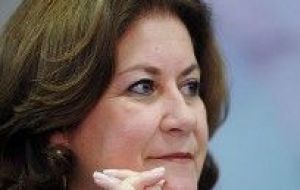MercoPress. South Atlantic News Agency
Brazil 2012 budget estimates: primary surplus 3.1% of GDP, dollar at 1.76 Real
 Planning Minister Miriam Belchior said “the government is pursuing a defined surplus target.”
Planning Minister Miriam Belchior said “the government is pursuing a defined surplus target.” Brazil is aiming for a primary budget surplus of 3.1% of GDP in 2012 as the government tries to put its public accounts back into better shape. Brazil’s economy is expected to grow 5.0% in 2012, compared to a 4.5% growth forecast for this year, according to an outline of the 2012 budget released Friday.
Brazil's fiscal position deteriorated rapidly in the last year of President Lula da Silva's administration but the government now hopes around 30 billion USD worth of budget cuts in 2011 will bring the country's accounts back in order with a primary budget surplus of 117.9bn Real this year (2.9% of GDP).
“The foundations of economic policy won't change” said Planning Minister Miriam Belchior said. “The government is pursuing a defined surplus target.”
Belchior added the government savings effort would be particularly aided next year by the elimination of more than 10 billion Real in non-constitutional mandated spending that had been inserted into federal budgets in recent years.
Latin America's largest economy grew 7.5% in (electoral year) 2010, far outpacing developed economies and pushing price pressures to the top of the government's target range. Policymakers aim to keep inflation this year at 5%, plus or minus 2 percentage points an d 4.5% in 2012.
The budget projections released Friday also take into account average exchange rate forecasts of BRL1.69 to the US dollar for 2011 and BRL1.76 to the dollar for 2012, and year-end Selic interest rate forecasts of 11.75% in 2011 and 10.75% in 2012.
Belchior said the government was betting that local inflation would begin to decelerate in the second half of the year from current 12-month levels of around 6.3% and that it didn't look to rising interest rates ahead.
“The evaluation of the Finance Ministry is that it's possible to arrive at those interest-rate levels,” Belchior said. “If inflation declines in the second half there's no reason to plan for higher interest rates.”
Brazil's central bank has raised the country's reference Selic interest rate by 1.5 percentage points since December to 11.75% annually, and according to recent market surveys is seen raising the rate further to at least 12.25% before the end of this year as part of its inflation control efforts.
In addition to economic parameters for 2011 and 2012, the document Friday also outlined government expectations for economic indicators through 2014.
The government said it projected the economy would grow at a rate of 5.5% in 2013 and 2014, and that inflation would be stable in those years at 4.5%. It projected the Selic rate would end 2013 at 10% and decline to 8.5% by the end of 2014. The country's currency, the government said, would likely average BRL1.82 to the dollar in 2013 and weaken to an average of BRL1.86 to the dollar over 2014.




Top Comments
Disclaimer & comment rulesCommenting for this story is now closed.
If you have a Facebook account, become a fan and comment on our Facebook Page!